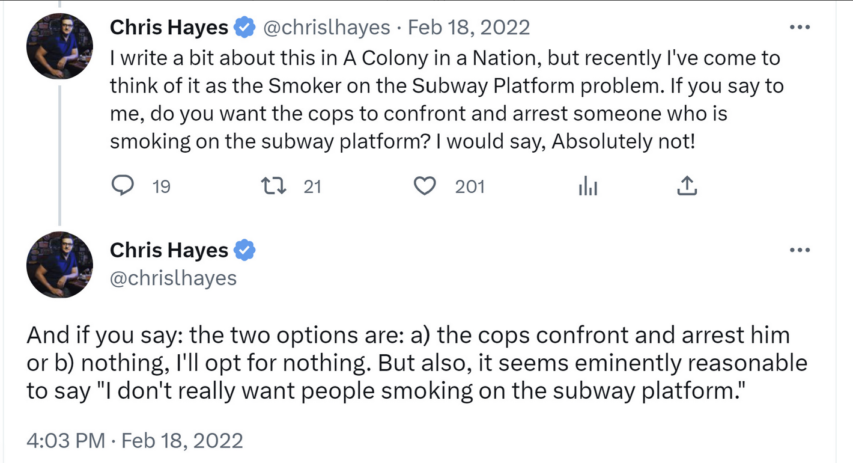Forgotten Weapons
Published 3 Nov 2022The Auto Ordnance company made a couple of different types of cases for the Thompson SMG, and today we are going to look at two of the most common and one exceptionally cool type. The two most typically found are the Police and FBI cases. Both of these hold the gun along with the detached stock, one drum, and four box magazines. The Police type has the drum and box mags separated for balance and was lined with purple velvet; the FBI case was generally blue velvet and had all the magazines on the left (making it balance poorly).
The other case we have today is one fabricated by the Secret Service for one of its protective details. This is a flat-lying wooden case, which holds the gun, stock, and four box magazines — no drums for the Service.
(more…)
March 4, 2023
Thompson SMG Cases: Police, FBI, and Secret Service
QotD: Profit margins in the restaurant trade
This is an old rule of thumb, no more, from an experienced waitron unit.
The table that orders a starter, main and a bottle of wine – that just about breaks even for the restaurant. You can mix and match this a bit. Dessert instead of the starter, that sorta thing. But the costs of the building, the staff, the electricity, the stock that goes off, the cost of capital itself, all those things, mean that the basic restaurant experience just about covers its costs.
It’s the having the one thing extra that makes the money, the profit. A drink before the meal, having both a starter and a dessert to add to the main. The second bottle of wine, or the digestif with the coffee. This is why the waiter is so eager for you to have any one or more of these “extras”. The margin over food costs – food costs usually being around 30% of menu price – on those additions is exactly what provides a profit to the business that is the restaurant.
As to why, well, it’s the same reason that the menu prices of some well known item are going to be roughly the same across restaurants. Competition is fierce in the business. That means headline prices are pushed down to where they only just, if even that, cover costs. On exactly the same basis as Ryanair charging you spit for the seat and then a fortune for the air you breathe onboard. You get the punter in with the £20 for two steak dinners then hope like Hell they order the vanilla soup and also the vegetable ice cream in order to make your nut.
Tim Worstall, “Bar Owner Complains Of People Drinking Tap Water – Oi! Where’s My Profits?”, Continental Telegraph, 2019-05-27.
March 3, 2023
African Opinion in the War, Minor Axis Partners, and Foreign Ships in the British Navy – OOTF 30
World War Two
Published 2 Mar 2023How did the British manage their multinational Merchant Navy who are the non-American operators of Liberty ships? How did Kenyans, South Africans, and others from Britain’s Sub-Saharan empire view the war? And what is going on in Slovakia and Hungary right now? Find out in this episode of Out of the Foxholes.
(more…)
Conservatives keep re-enacting the Charlie Brown “kick the football” scenario
Theophilus Chilton on the evergreen Charlie Brown and Lucy impersonations of the conservatives and progressives in western political struggles:
If there is one thing that becomes apparent when you talk to a lot of normie conservatives, it is that they have absolutely no idea how or why they keep getting rolled over by the radical Left. They work and they work and they work to win elections, they invest their time and money to get “their guy” into office, only to find him selling them out on the first important issue within a month of taking office. They pass laws, only to be thwarted in the courts. When they win in the courts, they get thwarted by the bureaucracy. They try and try to force government to abide by the Constitution, but find that this document applies in one direction only. No matter what they do, they simply cannot keep Cthulhu from swimming left.
Why is this?
It’s because they fundamentally don’t understand how power actually works. In a sense, normie conservatives long for a world that never existed. They desperately want to “keep” a republic where politicians work for the public good and where government is truly restrained by its founding document. So it’s something of a bitter pill for them to swallow when they finally accept that such a thing doesn’t exist, and really hasn’t existed in any reasonable form in the United States since the Civil War. America has continued to move left for the past 150 years because the Left has been perfectly willing to do whatever it takes to win. The Left has become adept at “manipulating procedural outcomes,” by which is meant the ability to game the system to make an existing structure which is “supposed” to operate one way bring about outcomes which were never really intended (or even considered possible) by the people who put it into place.
How do you get around constitutional restraints on, say, gun laws or federal encroachments on state prerogatives? Well, one example would be to use fraud and deceit to subvert the Constitution’s provision for elections to get your people in office, who then use the Constitution’s provisions for nominating and approving judges to get friendly judges in power, who then use the (dubiously) constitutional provision for judicial review to decide that whatever laws you want to pass are “constitutional.” Other than the initial fraud (which, since you run the show now, isn’t going to be challenged in any substantive way), everything you did was “technically” in line with the Constitution, even though the results are quite the opposite of what was actually intended. Wanna pack the Supreme Court? Technically, it’s legal! Ban political speech you don’t like? Call it “hate speech” and enforce it under provisions in administrative law that have already been allowed to stand by your judges. The Left has become very adept at appearing to “follow the rules” while working the system to undermine that same system for its own ends.
So that’s “how” the Left always seems to beat conservatives, even when conservatives manage to win an election. But WHY does this happen?
It happens because conservatives ALLOW it to happen.
Let’s be brutally honest here – normie conservatives are saps. They continue to play a rigged game, no matter how often they lose. And they do so because they believe it is virtuous to hold onto “principles” which inevitably lead to failure after failure. They never consider that if “holding to their principles” means the destruction of everything they profess to hold dear, then those principles are terrible principles that should perhaps be reconsidered. If you pat yourself on the back for your virtue in “playing by the rules” even as your house burns down around you and the neighbours are making off with all your stuff, then you’re the source of the problem. Don’t blame somebody else for capitalising on your stupidity.
Miles Davis – “So What” (Official Video)
Miles Davis
Published 19 Oct 2010Official music video for “So What” by Miles Davis
Listen to Miles Davis: https://MilesDavis.lnk.to/listenYD[Come for Miles Davis, stay for the John Coltrane solo]
(more…)
QotD: What’s the opposite of university? “Diversity”
That was one of the things that made faculty meetings such joys, back in my professin’ days — no matter how trivial the issue at hand, the meeting couldn’t move forward until everyone had gotten up on xzyher soapbox and delivered xzheyr standard diatribe. “As a post-structuralist lesbian Maoist furry, I feel that …” The outside observer would see a room full of identical freaks, but the people inside saw a glorious rainbow of diversity. Real diversity. God help us, they really did. They really do. It’s one of the keys to understanding them.
Severian, “Advice to Young Dissidents”, Rotten Chestnuts, 2020-04-01.
March 2, 2023
Anti-Tank Chats #6 | The Panzerfaust | The Tank Museum
The Tank Museum
Published 4 Nov 2022Historian Stuart Wheeler is back with another anti-tank chat. In this episode, he is looking at the development and use of the legendary panzerfaust.
(more…)
March 1, 2023
School Lunch from the Great Depression
Tasting History with Max Miller
Published 28 Feb 2023
(more…)
If the Freedom Convoy “actually was what it has often been portrayed as on social media — a horde of thousands of literal Nazis and Confederates set on violently overthrowing our democratically elected government — then [we’d] be living in the Confederate Republic of Nazi Canada by now”
In The Line, Matt Gurney explains how going through Justice Paul Rouleau’s Public Order Emergency Commission report in detail leads to some uncomfortable realizations about Canadian goverment and policing — at all three levels — failed to meet minimal expectations of competency and capacity:

A screenshot from a YouTube video showing the protest in front of Parliament in Ottawa on 30 January, 2022.
Photo via Wikimedia Commons.
The convoy crisis — and I’m mostly speaking here about the events in Ottawa, though the situation at the border crossings fit the same general pattern — forced Canadian police and political leaders to respond quickly to evolving circumstances. And Rouleau’s report is just a relentlessly brutal catalogue of the ways they failed.
Is it really necessary at this point to recap the failure of the Ottawa police? We at The Line have long maintained that the complete failure of the Ottawa police to plan for and control the protest not only allowed the convoy to entrench itself, but also established the psychological paradigm that would define the crisis for weeks: the convoyers held the initiative (not to mention the capital) and the Canadian state was befuddled and adrift. From that, a national crisis was born. Rouleau is just devastating. “The OPS [Ottawa Police Service]’s planning challenges,” he notes on page 56 of the first volume, “were compounded by a general breakdown of command and control.” Super.
He’s even more brutal on page 185 of the second volume: “The influx of Freedom Convoy vehicles and the disruptive behaviour by some protesters threw the OPS operational command at the NCRCC [a command centre] into a state of dysfunction. OPS Inspector Lucas described the atmosphere at the NCRCC as chaotic and explained that he and his team had neither the capacity to process the incoming information nor the resources to respond to the needs it was facing. In the late afternoon of January 29, the OPP’s [Ontario Provincial Police] representative at the NCRCC, Inspector Dawn Ferguson, reported to OPP Superintendent Abrams that OPS members in the NCRCC were panicked and were swearing and yelling orders at each other and at partner agencies.”
Huh.
Moving up a level of government, much has already been written about the cowardice of the Ford government. If any agency performed semi-well, it was the Ontario Provincial Police. The OPP was the force that was generating most of the critical intelligence used (or ignored) during the crisis. It was quick to realize that command-and-control had collapsed in Ottawa (see above), and to begin working with the RCMP on a plan — eventually a series of plans — to restore order. You can’t read POEC and conclude the OPP performed perfectly. Far from it. It was probably the best we had, though, but because Ford took a gander at the mess in Ottawa and decided to mosey on off to the cottage, it couldn’t do much.
Huh.
And that leaves us with the feds. I have maintained since last year that the federal government hasn’t received nearly enough attention in our understanding of what the hell went wrong last year. This has caused a fair degree of pushback, especially from Liberal supporters who read any reference to the “federal government” as “our beloved prime minister”. But no — while I don’t think the prime minister or the federal cabinet did particularly well during the crisis, the real federal failures were in the officials that supported the PM and his ministers.
Among the many other failures, the inability of the various government and police organizations to organize and properly share the information they were handling is perhaps the most disturbing:
If you want to see it yourself, check out pages 38 and 39 of the third volume. For those in a hurry, though, it turns out that even within the government, the flow of information was so bad that the clerk of the privy council, and the prime minister, noted that staff were learning about the convoy not via internal reports, but social media. The federal government had, as Juneau and Rigby have noted, “intelligence gaps” that “hampered the government’s ability to understand, anticipate, and respond to the situation, and to reconcile conflicting information such as contradictory reports about the size of the convoy”. The federal government didn’t have the software to process and analyze online posts, even public ones.
And then there was this (my emphasis added):
[National Security and Intelligence Advisor] Thomas also described an information-sharing gap between law enforcement and government. Assistant Secretary to the Cabinet, Security and Intelligence, Michael MacDonald recalled a significant delay in receiving updates from the RCMP, due to the RCMP’s obligation to consult with each intelligence agency that has provided the RCMP with information prior to sharing that information further (known as the “third party rule”). The NSIA’s office did not receive situation reports, project reports, or other forms of information, such as Project Hendon reports, that the RCMP obtained from other law enforcement agencies. Prior to the events of the convoy, the NSIA was not aware of Project Hendon. …
NSIA Thomas further stated that it was sometimes difficult to know how to interact with law enforcement agencies. She recognized that government must not interfere in operational matters, but thought that there was nonetheless useful information that could have been provided to decision makers without encroaching upon police independence. However, senior officials were uncertain how to obtain that information, and were concerned about “crossing the line” both in requesting information and in discussing solutions.
… huh.
And that doesn’t even cover our now-outgoing national commissioner of the RCMP being so clueless she decided to just not mention germane information during a critical meeting because … well, we never really got a good explanation for that one. Oh well. Enjoy your retirement, Commissioner Lucki!
Mauser WW1 Flyer’s Rifle: the Flieger Selbstlader Karabiner 1916
Forgotten Weapons
Published 1 Nov 2022Paul Mauser dedicated much of his life to the development of a practical semiauto military rifle, and did manage to have a design that was used in combat by Germany in World War One. It began with the model 06/08, a short-recoil, flap-locked design made in both rifle and pistol form. The short recoil idea was disliked by the military for a shoulder rifle, and so Mauser redesigned it to be inertially locked with a fixed barrel. This was sold in small numbers as a sporting rifle, and tested by the military a few years before the war. Once war began, Mauser once again submitted the design for use in an infantry configuration, but the system was too delicate for infantry combat. A second pattern was made for use by fliers, and this was accepted and used in service for that brief period between the introduction of military aviation and the adoption of aerial machine guns.
Designated the FSK-16 (FliegerSelbstladeKarabiner 1916), it was used primarily by balloon and Zeppelin crews. With a large magazine and self-loading action, it was much better for use in aircraft than the typical bolt action infantry rifles — and there was no mud to get into the action while airborne.
(more…)
QotD: What do we mean by “the humanities”?
First, just to define my terms, what are the humanities? Broadly, they are the disciplines that study human society (that is, that are concerned with humanity): language study, literature, philosophy, history, art history, archaeology, anthropology, and so on. It is necessarily a bit of a fuzzy set. But what I think defines the humanities more than subject matter is method; the humanities study things which (we argue) cannot be subjected to the rigors of the scientific method or strictly mathematical approaches. You cannot perform a controlled trial in beauty, mathematical certainty in history is almost always impossible, and there is no way to know much stress a society can bear except to see it fail. Some things cannot be reduced to numbers, at least not by the powers of the technology-aided human mind.
By way of example, that methodological difference is why there’s a division between political science and history, despite the two disciplines historically being concerned with many of the same subjects and the same questions (to the point that Thucydides is sometimes produced as the founder of both): they use different methods. History is a humanities discipline through and through, whereas political science attempts to hybridize humanities and STEM (Science, Technology, Engineering and Mathematics) approaches; that’s not to say historians never use statistical approaches (I do, actually, quite a lot) but that there are very real differences in methodology. As you might imagine, that difference leads to some competition and conflict between the disciplines as to whose methodology best answers those key questions or equips students to think about them. Given that I have a doctorate in history and self-identify as a historian, you will have no trouble guessing which side of this I come down on, although that might be a bit self-interested on my part.
So if the STEM fields are, at some level, fundamentally about numbers, the humanities are fundamentally about language. The universe may be made of numbers, but the human mind and human societies are constructed out of language. Unlike computers, we do not think in numbers, but in words and consequently, the study of humans as thinking creatures is mostly about those words (yes, yes, I see you there, economics and psychology; there are edge cases, of course). Our laws are written in words because our thoughts form in our heads as words; we naturally reason with words and we even feel with words. Humans are linguistic creations in a mathematical universe; consequently, while the study of the universe is mediated through math, the study of humans and human minds is fundamentally linguistic in nature.
Thus, the humanities.
Bret Devereaux, “Collections: The Practical Case on Why We Need the Humanities”, A Collection of Unmitigated Pedantry, 2020-07-03.







